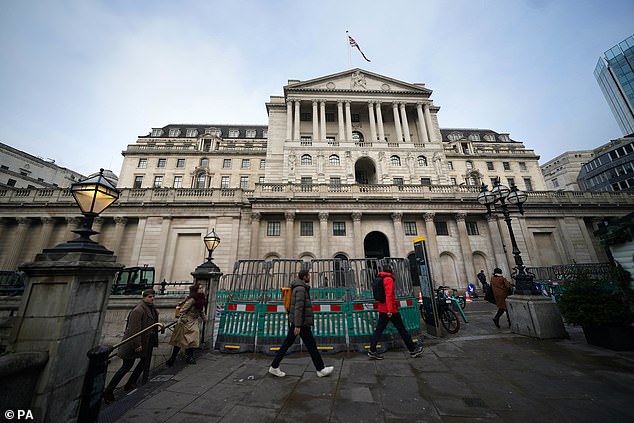From inflation to interest rates, reasons to be happy amid the gloom: HAMISH MCRAE
Tis the season for celebration, but not much of that is in the air for reasons we all know. But should that sense of gloom apply to the economy and finance as well as to geopolitics? It is easy to argue that this should be the case.
There has been very slow growth at best in Britain and Europe. Real incomes may be rising, but after a large decline earlier this year.
UK share prices have been flat, with the FTSE 100 index up just 2 per cent this year, so down significantly when taking inflation into account.
Tax cuts: Jeremy Hunt reportedly considering tax cuts for 2024
Taxes as a percentage of gross domestic product (GDP) are expected to reach their highest level since 1949, yet the quality of government services is uneven at best.
There have been all these strikes and to top it all off there is the threat of a recession next year. It feels more Scrooge than Santa Claus.
But is this correct? Christmas is certainly also a time to count our blessings, and there are many.
More important, however, is the growing evidence that the UK economy is at some kind of turning point, and as the coming year progresses we will all become more aware of the positives and less pressured by the rest.
The blessings include the lowest unemployment since the 1970s, the lowest in almost anyone's working life. The average household wealth is £302,500, so it's not just the rich who are doing well – people in the middle are doing well too.
Income inequality has been largely stable since the early 1990s, and figures from the Office for National Statistics (ONS) show it is slightly lower than its peak in 2008 under the last Labor government – not many people realize that .
And of course, our blessings should also include elements that are not counted in monetary terms, including better health than ever before. Nothing is perfect, but we need a sense of proportion. Now look ahead. The big change we will see in the coming year is the disappearance of inflation.
Disappearance? Well, not quite, but just as the Bank of England grossly underestimated the rate of increase, it is now making the same mistake in reverse.
Private sector forecasts, such as those from Pantheon Macroeconomics, assume we will be back to 2 percent by the summer. That will pave the way for interest rate cuts.
That is what the markets already offer. I'd rather talk about the importance of the 10-year Treasury yield, but it really matters because it affects all long-term borrowing costs.
In October this was more than 4.5 percent. Last week it fell to 3.75 percent and on Friday it fell to below 3.5 percent. This is amazing. I can't remember a time when the cost of long-term borrowing has fallen as quickly as it has in recent weeks, and this will ripple across the economy in the coming year.
We will see that in all kinds of ways. House prices will recover. They may fall a bit more, but they should rise by summer and be back to their record highs of fall 2022 by the end of the year.
That will fuel consumption, because when we move we always have to buy things to put in the new place.
There is room for that. Household savings are much higher than they have been for most of the last two decades, suggesting that as people become more confident, they will be able to spend more.
And since household consumption accounts for by far the largest share of GDP, more than 60 percent of it, this goes directly to economic growth.

Cuts: Interest rates are likely to be cut next year, which means better news for borrowers
Grow? Well, there were dismal GDP figures last week, but given the ONS continues to revise its figures, I really think we should take all those stats with a grain of salt and look at real data instead.
Companies are hiring at unprecedented levels of employment, and they wouldn't be doing so if they expected a recession next year.
Tax revenues are very high – rather too high for those of us who pay income taxes before January 31 – and that means the economy must be doing well.
And for what it's worth, forward-looking data such as the Purchasing Managers' Index for Britain points to modest growth in the coming months.
It is always difficult to translate general economic and financial forces into what will happen to the real economy, but intuitively I think 2024 will be a year of two halves.
The first half will be one in which there is still a lot of uncertainty.
But once the Bank of England eases up and cuts rates, and our Chancellor starts cutting taxes, the second half will feel much brighter. Relief.
DIY INVESTMENT PLATFORMS

A. J. Bell

A. J. Bell
Easy investing and ready-made portfolios

Hargreaves Lansdown

Hargreaves Lansdown
Free fund trading and investment ideas

interactive investor

interactive investor
Invest for a fixed amount from € 4.99 per month

eToro

eToro
Investing in shares: community of more than 30 million

Bestinvest

Bestinvest
Free financial coaching
Affiliate links: If you purchase a product, This is Money may earn a commission. These deals have been chosen by our editors because we believe they are worth highlighting. This does not affect our editorial independence.
Compare the best investment account for you
Some links in this article may be affiliate links. If you click on it, we may earn a small commission. That helps us fund This Is Money and keep it free to use. We do not write articles to promote products. We do not allow a commercial relationship to compromise our editorial independence.

